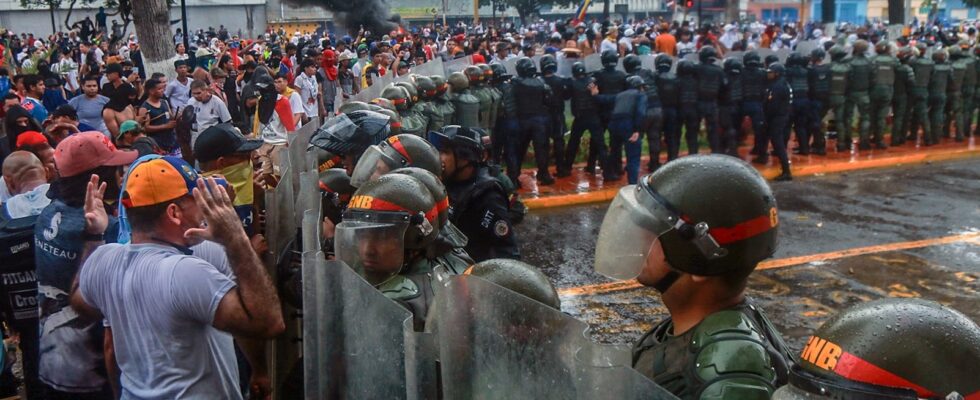The words in the outgoing president’s mouth sound almost like a provocation. “I want to congratulate this professional, humane and powerful National Guard,” Nicolás Maduro said during a ceremony for the 87th anniversary of the Armed Forces, this Sunday, August 4. A military body responsible for enforcing public order, the Bolivarian National Guard has been in great demand by the government since the election on Sunday, July 28.
Following the presidential election, Nicolás Maduro still claims victory, supported on August 2 by the National Electoral Council. But the opacity surrounding the revelation of the results has led to significant suspicions of fraud, pushing Venezuelans into the streets. The population’s anger has been directed against symbols. Statues of Hugo Chavez, his predecessor between 1999 and 2013, have been toppled. The clashes have already resulted in the deaths of 13 people.
Through Defense Ministry Gen. Vladimir Padrino, the military reaffirmed “the most absolute loyalty and [son] “unconditional support” for the Venezuelan dictator, presented as the “constitutional president […]our commander in chief legitimately reelected by popular power.”
Equipped by Russia
With 343,000 men in 2020 according to the International Institute for Strategic Studies – as many as the Mexican armed forces, despite having four times the population – the Bolivarian National Armed Force (FANB), militarily equipped by Russia, is the keystone of the Venezuelan regime. So much so that the opposition candidate, Edmundo Gonzalez Urrutia, addressed it in early July in a letter in which he called on it “to respect and to ensure respect [la] “sovereign will” of the people.
“In the history of Venezuela, it is always the army that decides last,” analyzes in our columns Mariasol Pérez Schael, Venezuelan intellectual and former director of the newspaper Excess – censored under Chavez. She recalls that the history of Venezuela is closely linked to the military question. During the colonial era, the territory was the “barracks” of the Spanish empire in the Americas. In the 19th century, the independence fighter Simon Bolivar – to whom Maduro and a good number of Latin American leaders claim to be descended – was “a civilian who, once he became a soldier, imposed order through the armed forces”. To his declaration of loyalty to Nicolás Maduro, Vladimir Padrino added that the army would act “with force” to “preserve internal order”.
Venezuela and the army, quite a story
Even though the army reaffirms its support for Maduro, it is more a show of loyalty than an act of submission. “Maduro does not have military leadership as such. He conquered the armed forces with privileges, promotions and the creation of new positions,” believes retired general Antonio Rivero, a critic of Chavismo in exile in the United States. These remarks are supported by Mariasol Pérez Schael. “If a fracture appears at the heart of the system, particularly in the army, then everything can change,” anticipates the former columnist. Hence the attempt by the opposition candidate, banking “on cracks announced by some in the army’s support for power,” specifies AFP.
It was Hugo Chavez, a lieutenant colonel in the army who later became president, who was behind the dynamic that the current government maintains with the military. With the new Constitution of 1999, he gave the army key positions in the administration and the economy, and granted its members the right to vote.
Today, it controls mining, oil and food distribution companies, as well as customs and 12 of the 34 ministries, including important portfolios such as Oil, Defense, Interior and Trade. “The Bolivarian National Armed Force supports me, it is Chavista, it is Bolivarian, it is revolutionary,” Nicolás Maduro reaffirmed this week while in the streets, the military continues to shout: “Chavez lives.”
